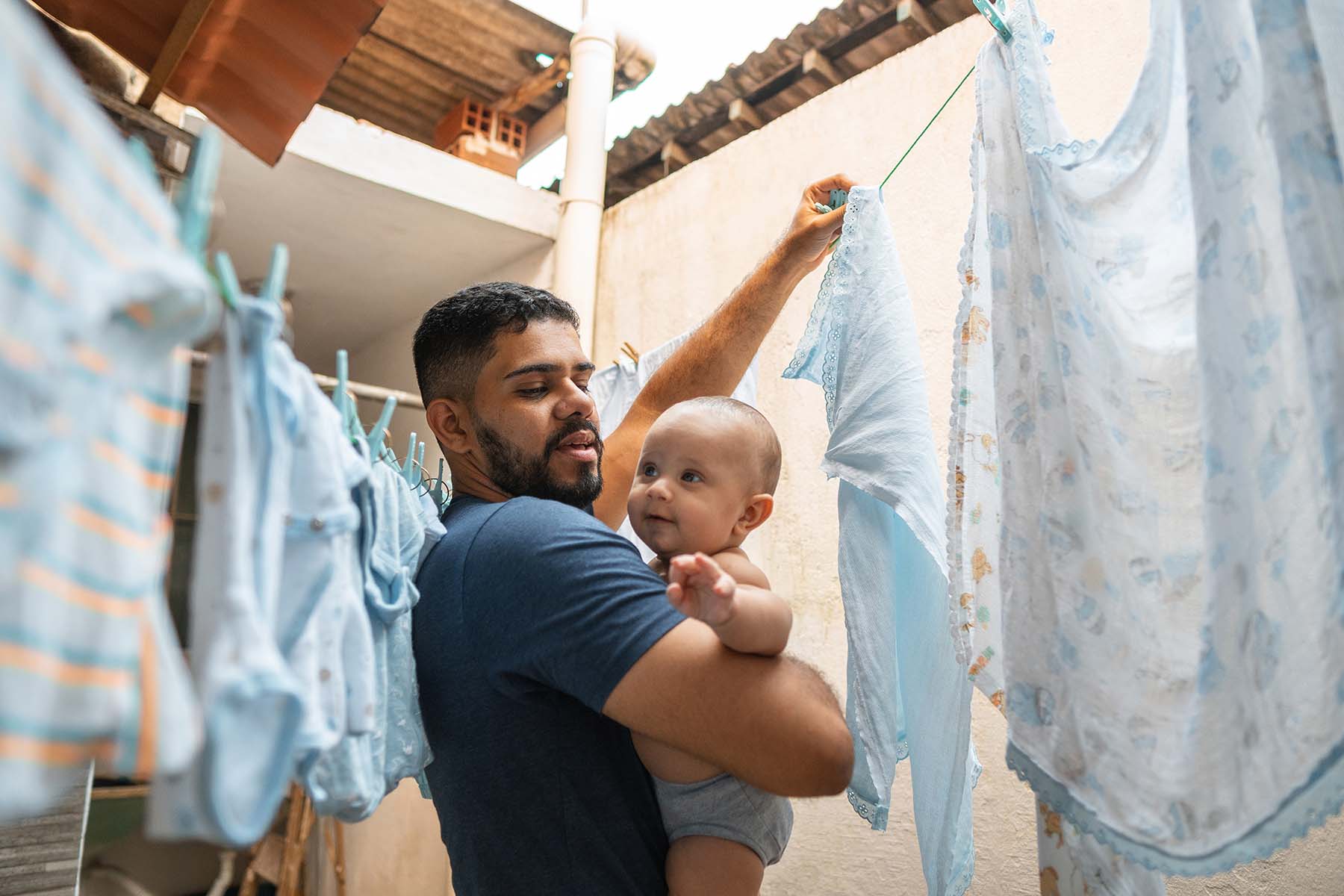Postpartum Depression – in Dads?

When we talk about postpartum depression, our thoughts immediately turn to the new mother. However, paternal postpartum depression is a real condition.
One in 10 new dads is affected by postpartum depression, and experts say the illness, with its wide range of symptoms, often goes undetected by both the medical community and the man himself.
“It’s certainly less recognized [among men],” says Vanessa L. Padilla, M.D., a psychiatrist with the University of Miami Health System. “We screen for symptoms with a mother. We understand she’s carrying a baby, she’s dealing with hormones and many changes, but we may underestimate that the other parent may be going through some of the same adjustments.”
Male postpartum depression cuts across cultures, ethnic and racial groups, and socioeconomic levels, Dr. Padilla adds. Yet, there are many reasons why it goes undiagnosed — and untreated. Most men do not accompany the mothers to doctors’ visits during pregnancy and therefore miss an opportunity to be screened. In addition, there are no established medical criteria to diagnose specific postpartum depression among male parents.
The stigma of mental health issues also plays a part.
“Men may not feel comfortable talking about their depressive symptoms,” Dr. Padilla says. “It may be difficult to admit to certain feelings.”
While both parents may share some postpartum symptoms, men may display different signs at different times. Usually, women may exhibit symptoms of postpartum depression within a month after delivery. On the other hand, fathers may not show signs until four to six months old after the birth of a child, and sometimes later.
Mothers and fathers with postpartum depression will experience bouts of worry and sadness for several weeks. They may feel anxious or exhibit a lack of energy. This is not to be confused with “the baby blues,” when sleep deprivation and changes in a family’s routine can wreak havoc with moods. Postpartum depression is more intense and lasts longer, Dr. Padilla explains.
Men, more than women, may express anger and irritability and feel more detached from the new baby. Substance use is not unusual during this time, either.
“We’ve found that men tend to isolate more,” she adds. “And they don’t necessarily say, ‘I’m sad.’ It’s more, ‘I’m frustrated.’”
In more severe cases, men may experience suicidal thoughts or thoughts about harming their partner or baby. These situations are an emergency and should be addressed immediately. Dr. Padilla recommends the parent (or concerned family member) call the new 988 mental health hotline, which is open around the clock.
“The resources exist,” she says.
Providers can screen parents and family members with the Edinburgh Postnatal Depression Scale (EPDS) as a self-assessment tool for postpartum depression. The EPDS is a set of 10 screening questions that can signal if a new mom or dad has symptoms of depression.
The scale includes questions on sleep habits, sadness, and feeling overwhelmed. However, only a trained health professional can diagnose depression or other mental health conditions.
Some men may be more at risk than others.
In her practice, Dr. Padilla has found that fathers living with mothers experiencing postpartum depression are more vulnerable to the condition.
Those who are younger and stuck in uncertain, vulnerable socioeconomic situations also run a higher risk of postpartum depression. And if they have a history of depression or anxiety, a man is more likely to develop postpartum depression, too.
“Depression is a recurring disease,” Dr. Padilla says. “A depressive episode can come back when someone is under a lot of stress.”
The good news is that depression can be successfully treated.
A physician may prescribe medication — usually an antidepressant — and/or psychotherapy (talk therapy), such as cognitive behavioral therapy or couples therapy.
Postpartum Support International hosts online support groups for both men and women.
Dr. Padilla is also a strong proponent of parents accepting help from each other and relatives.
“Both parents don’t have to be awake at the same time,” she says. “You can take turns with the baby, so the other parent can get some sleep.”
Awareness of postpartum depression in men is growing.
This makes Dr. Padilla optimistic that more men will be screened and, hence, receive treatment. She encourages primary physicians to be on the lookout for telltale signs of depression in new fathers. At UHealth, patients are screened for depression, regardless of the type of appointment.
And in her practice, she asks new mothers not only about their own mental health but also about their partners.
“We need to look at how we can support men and women in their reproductive years,” she concludes. “As a society, we have to conceptualize how we can best support parents when they are experiencing so many changes.”

Ana Veciana-Suarez, Guest Columnist
Ana is a regular contributor to the University of Miami Health System. She is a renowned journalist and author, who has worked at The Miami Herald, The Miami News, and The Palm Beach Post. Visit her website at anavecianasuarez.com or follow @AnaVeciana on Twitter.
Tags: behavioral medicine, male healthcare, mental health, parent health, pregnancy care in Miami, untreated postpartum depression, Vanessa Padilla
